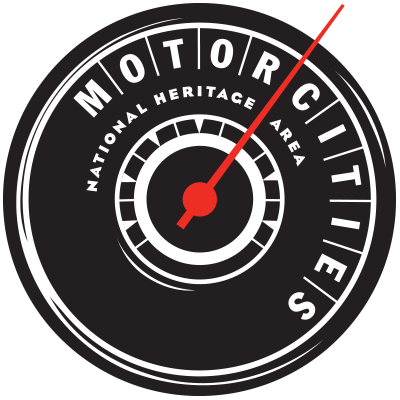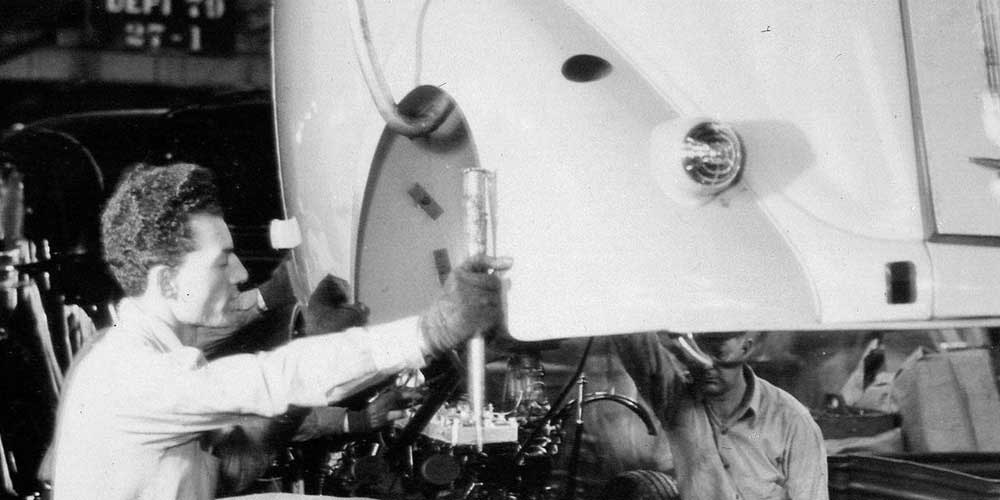By Jeffrey D. Brasie
Images Courtesy of the DIVCO Club website
Published 11.27.2024
 A DIVCO Truck ad
A DIVCO Truck ad
Many metro Detroiters might fondly recall the unique DIVCO trucks traversing the city and suburban streets delivering Twin Pines dairy products and Awrey baked goods.
When compared to Ford, General Motors, Chrysler and International Harvester trucks, the snub-nosed DIVCO truck tended to be the most prominent vehicle for dairy, baked goods, laundry, and related product deliveries.
The Detroit Industrial Vehicle Company (DIVCO) was established in 1922 and was associated with the Electric Vehicle Company (EVC). The company’s chief engineer, George Bacon, challenged existing design concepts stating battery power was no match for winter weather, heavy loads or long delivery routes.
 A DIVCO 1926 Model A
A DIVCO 1926 Model A
Along with other investors, Bacon broke away from EVC and founded DIVCO. By the beginning of 1926, a prototype delivery truck was developed, and 25 more vehicles were produced for Detroit Creamery.
The design was quite boxy in shape with a front hinged door where the driver would step forward over the axle. With extensive “multi stop” needs, the vehicle offered a heavy-duty brake and clutch system.
In 1928, DIVCO redesigned the vehicle with a shorter hood as a van or open-sided body. Steering was either by standing or sitting and could also be operated from the truck’s running boards using a tiller for steering.
The Great Depression took its toll on many manufacturers, including DIVCO. In 1932, the company was purchased by Continental Motors.
 A milkman makes a delivery from his DIVCO truck.
A milkman makes a delivery from his DIVCO truck.
However, four years later in 1936, DIVCO was able to manipulate its stock and divest itself from Continental and merged with the Kent, Ohio based truck business, the Twin Coach Company.
With the arrival of 1937, the first snub-nosed hood and all-welded body truck was introduced. The vehicle sported a front end image similar to a Volkswagen.
In 1939, a new DIVCO manufacturing plant was opened on Detroit’s Hoover Road. That year’s truck design offered semi-automatic folding doors.
With the advent of 1940, DIVCO introduced its first insulated and refrigerated delivery truck. The earlier models, loaded with milk crates, were covered with ice. Historical accounts revealed these early models tended to rust from the inside out.
Along with numerous other manufacturers, when the U.S. entered World War II, DIVCO shifted to wartime production.
DIVCO Club of America’s website noted that, immediately after the conclusion of the war, annual vehicle production zoomed to 7,000 units.
 Another DIVCO truck on the job for Twin Pines Dairy
Another DIVCO truck on the job for Twin Pines Dairy
In 1957, DIVCO bought Wayne Works, a school bus builder located in Richmond, Indiana. The combined manufacturer was renamed DIVCO-Wayne Corporation.
The smaller snub-nosed trucks maintained their signature design. However, the company put more emphasis on larger vehicles to tap into more delivery truck markets like the growing wholesale dairy industry. The Dividend Series trucks were also modified with seats and windows from the Wayne Works to produce a Dividend Bus, but very few of these units were built between 1959 and 1961.
Starting in 1964, the snub-hood models were manufactured in several sizes. These forward-control Dividend units were offered in three designs to carry 3,000-to-9,200-pound payloads.
The DIVCO Club noted the largest DIVCO truck ever made appeared in 1961. It was a six-ton refrigerated wholesale delivery model offered in 14, 16, or 18-foot body lengths.
In 1968, the DIVCO-Wayne Corp. was acquired by Boise-Cascade, Inc. Delivery truck production was spun off to Highway Products, Inc., a company using the former Kent, Ohio plant to build trucks and buses.
Highway Products immediately resold the DIVCO line to Trainsairco, later called Correct Manufacturing, located in Delaware, Ohio. That year, production was moved from Detroit to Delaware.
 A DIVCO truck display
A DIVCO truck display
The DIVCO assembly line reopened in 1969 producing far fewer trucks. The final models were the 300 and 200 series with 115 inch and 127-inch wheelbases with load capacities ranging from 6,000 to 10,000 pounds. Chassis were also produced for other uses, including DIVCO trash removal trucks.
In addition to DIVCO, Correct produced truck beds and Skyworker Cranes. Unfortunately, product liability claims forced the company into bankruptcy in 1985, and the final DIVCO trucks were produced in January 1986. America’s last DIVCO dealership was Tri-City DIVCO Sales located in Rock Island, Illinois.
In an article from Fleet Owner, Ken Lego, past DIVCO Club president, said, “A lot of dairies, bakeries, laundry companies and diaper services used them. They were a pretty handy truck to use for deliveries to homes because you could stand up and drive them besides sitting down.”
For more detailed information on DIVCO, including upcoming events and contact information, visit www.divco.org.
Jeffrey D. Brasie is a retired health care CEO. He frequently writes historic feature stories and op-eds for various Michigan newspapers and magazines. As a Vietnam-era veteran, he served in the U.S. Navy and U.S. Naval Reserve. He served on the public affairs staff of the Secretary of the Navy. He grew up in Alpena and resides in suburban Detroit.



